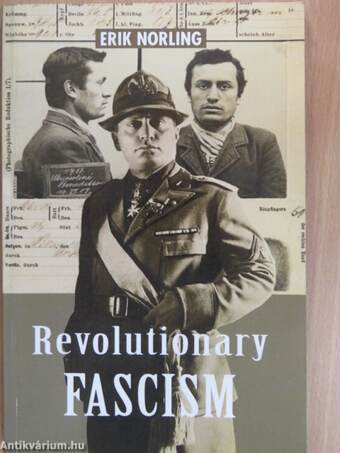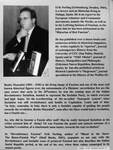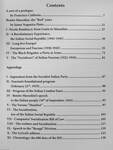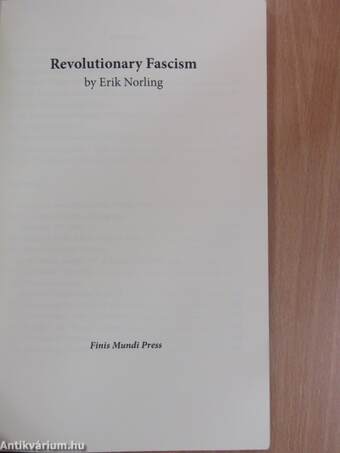1.063.503
kiadvánnyal nyújtjuk Magyarország legnagyobb antikvár könyv-kínálatát

VISSZA
A TETEJÉRE
JAVASLATOKÉszre-
vételek
Revolutionary Fascism
| Kiadó: | Finis Mundi Press |
|---|---|
| Kiadás helye: | |
| Kiadás éve: | |
| Kötés típusa: | Ragasztott papírkötés |
| Oldalszám: | 143 oldal |
| Sorozatcím: | |
| Kötetszám: | |
| Nyelv: | Angol |
| Méret: | 23 cm x 15 cm |
| ISBN: | 978-989-8336-26-2 |
naponta értesítjük a beérkező friss
kiadványokról
naponta értesítjük a beérkező friss
kiadványokról
Fülszöveg
-m
Erik Norling (Gothenburg, Sweden, 1964),
is a lawyer and an Historian living in
Malaga, Spain. He is an expert in the
European volunteer anti-Communist
movements, namely the Nordic, as well as
in the Leftwing factions of Fascism, to the
point that he has been nicknamed as the
"Historian of Red Fascism".
He has published over a dozen books and
numerous articles in historical magazines.
He writes regularly in "Aportes", journal
of contemporary History from the
University of CEU (San Pablo, Madrid,
Spain) and in "Nihil Obstat", journal of
History, Metapolitics and Philosophy
(Ediciones Nueva Republica, Barcelona,
Spain), he has also published articles in
Richard Landwehr's "Siegrunen", journal
specialized in the History of the Waffen-SS.
Benito Mussolini (1893 - 1945) is the living image of Fascism and one of the most well
known historical figures ever, the antonomasia of a Dictator: nevertheless few are the
ones aware that early in the 20thcentury he was the... Tovább
Fülszöveg
-m
Erik Norling (Gothenburg, Sweden, 1964),
is a lawyer and an Historian living in
Malaga, Spain. He is an expert in the
European volunteer anti-Communist
movements, namely the Nordic, as well as
in the Leftwing factions of Fascism, to the
point that he has been nicknamed as the
"Historian of Red Fascism".
He has published over a dozen books and
numerous articles in historical magazines.
He writes regularly in "Aportes", journal
of contemporary History from the
University of CEU (San Pablo, Madrid,
Spain) and in "Nihil Obstat", journal of
History, Metapolitics and Philosophy
(Ediciones Nueva Republica, Barcelona,
Spain), he has also published articles in
Richard Landwehr's "Siegrunen", journal
specialized in the History of the Waffen-SS.
Benito Mussolini (1893 - 1945) is the living image of Fascism and one of the most well
known historical figures ever, the antonomasia of a Dictator: nevertheless few are the
ones aware that early in the 20thcentury he was the coming man of the Italian
Revolutionary Socialism, headed to represent the Socialist Party, in which everyone
had high hopes for the overthrowing of the so-called "bourgeois system", when
Socialism was still revolutionary and hostile to Capitalism. Lenin said of him:
"in Italy, comrades, in Italy there is only a Socialist capable of guiding the people
towards the revolution, Benito Mussolini", soon after the Duce would lead a revolution,
but a Fascist one
So, why did he become a Fascist after wall? Has he really betrayed Socialism as his
critics accused him of doing? Or was Fascism the genial and natural outcome of a
Socialist's evolution, of a charismatic mass leader, towards the real revolution?
In "Revolutionary Fascism" Erik Norling, author of "Blood in the Snow:
The Russo-Finnish War" (Shelf Books, 2001), acquaints us not only with the
Revolutionary and Socialist roots of primeval Fascism but also describes the Italian
Social Republic period, at the end of the war, when these values reemerged in its
utmost purity. ISBN 978-989833626-2 Vissza
Témakörök
- Idegennyelv > Idegennyelvű könyvek > Angol > Történelem > Európa története > Egyéb
- Történelem > Idegennyelvű > Angol
- Történelem > Politika > Belpolitika > Egyéb
- Történelem > Legújabb kor > Egyéb
- Történelem > Kontinensek szerint > Európa, európai országok története > Dél-Európa > Olaszország
- Történelem > Politika > Politikai rendszerek
- Történelem > Politika > Pártok, szervezetek
- Történelem > Politika > Ideológiák > Fasizmus
- Történelem > Tanulmányok
Erik Norling
Erik Norling műveinek az Antikvarium.hu-n kapható vagy előjegyezhető listáját itt tekintheti meg: Erik Norling könyvek, művekMegvásárolható példányok
Nincs megvásárolható példány
A könyv összes megrendelhető példánya elfogyott. Ha kívánja, előjegyezheti a könyvet, és amint a könyv egy újabb példánya elérhető lesz, értesítjük.







